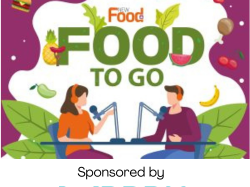Episode 54: A conversation with the FSA Part 2
- Like
- Digg
- Del
- Tumblr
- VKontakte
- Buffer
- Love This
- Odnoklassniki
- Meneame
- Blogger
- Amazon
- Yahoo Mail
- Gmail
- AOL
- Newsvine
- HackerNews
- Evernote
- MySpace
- Mail.ru
- Viadeo
- Line
- Comments
- Yummly
- SMS
- Viber
- Telegram
- Subscribe
- Skype
- Facebook Messenger
- Kakao
- LiveJournal
- Yammer
- Edgar
- Fintel
- Mix
- Instapaper
- Copy Link
Posted: 20 May 2024 | New Food Magazine | No comments yet
NEW PODCAST ALERT! In the second instalment of “A conversation with the FSA”, Assistant Editor Grace Galler sits back down with Emily Miles, Chief Executive of the FSA to talk all things food fraud and allergy safety.


This episode of Food to Go is brought to you by Merck. Explore the possibilities and learn more about Merck’s contribution to this exciting field at www.sigmaaldrich.com/HACCP
In the second instalment of “A conversation with the FSA”, Assistant Editor Grace Galler sits back down with Emily Miles, Chief Executive of the Food Standards Agency (FSA) to talk all things food fraud and allergy safety.
If you missed the first part, you can access the episode here.
In this episode, we discuss the current landscape of food fraud and measures to combat it. Emily highlights the importance of vigilance in a system where criminals seek to exploit vulnerabilities. She also highlights the FSA’s free food fraud hotline and how this aims to encourage reporting and ensure confidentiality for whistleblowers.
Additionally, Emily shares the FSA’s efforts to enhance allergen safety, particularly in light of Allergy Awareness Week. Emily addresses misconceptions surrounding vegan labelling and the regulator’s campaign to raise awareness. Grace and Emily also take time to explore the agency’s support for Owen’s Law.
Listen today to find out how these topics are shaping the future of food safety and regulation.
FSA launches consultation into authorisation of regulated products
Grace Galler (GG): What measures is the FSA implementing to reduce the impact of food fraud?
Emily Miles (EM): It’s actually the food businesses themselves who need to put in most of the effort. As I have mentioned, it’s really important that people report stuff to us or share their concerns if they are anxious about things that are going on.
I think the level of sampling that goes on is really good, and obviously the more sampling the better. Last year about 50,000 samples were taken by retailers and manufacturers and through the Food Industry Intelligence Network that was set up after the horse meat crisis about 10 years ago. That information gets shared with us in an aggregated, anonymised way so that we can see what kind of compliances and non-compliances are happening through that sampling. That helps us know where the risk is and then it helps local authorities focus on the risk too.
I think that intelligence picture also informs what retailers and manufacturers are looking at as well, and that really does inform our work on preventing and controlling food fraud.
Related topics
Allergens, Food Fraud, Food Safety, Regulation & Legislation, Supply chain





